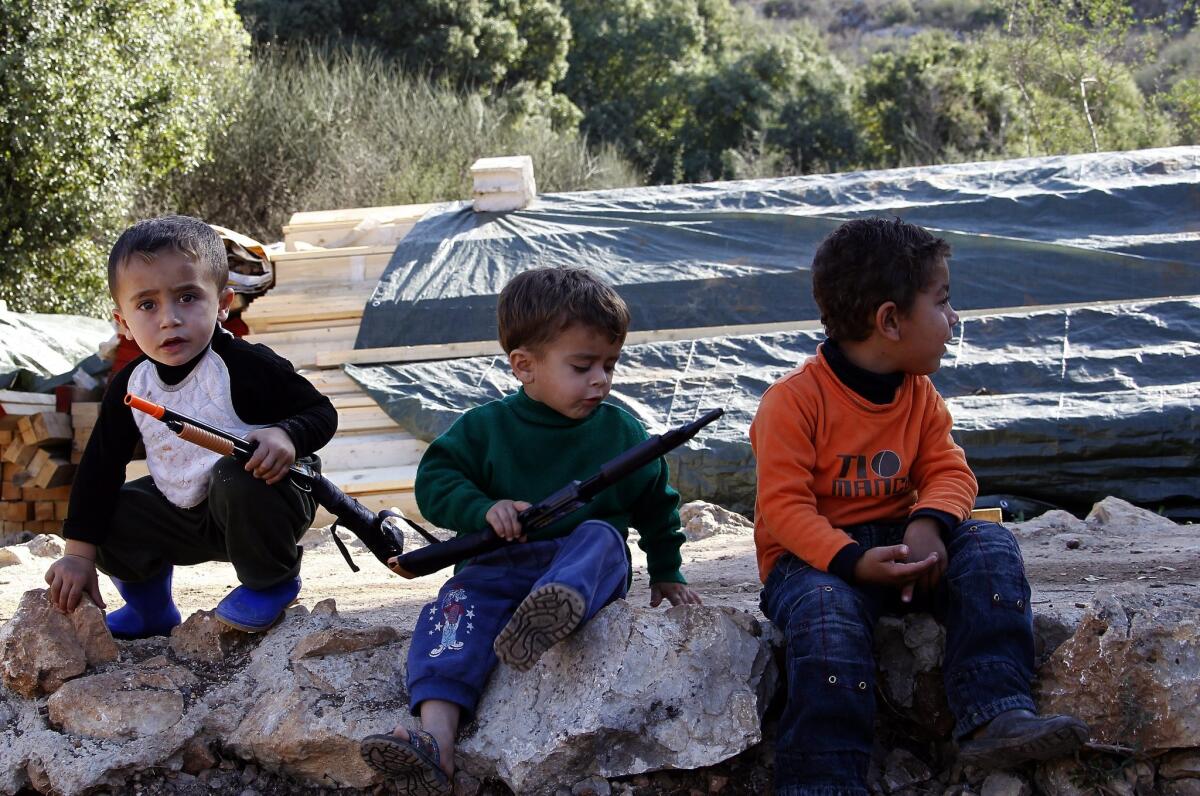One Syrian rebel group balks on peace talks, another uncertain

- Share via
BEIRUT — A day after the United Nations unveiled a January date for long-anticipated Syrian peace talks, the head of the U.S.-backed Free Syrian Army said Tuesday that his group had no intention of attending unless it was guaranteed that President Bashar Assad would relinquish power.
“We ... will not participate in the conference without clarifications and assurances that the demands we repeatedly announced will be met, primarily the departure of Syria’s executioner and criminal from power,” Gen. Salim Idriss said in an interview with Al-Jazeera, the pan-Arab satellite network.
Meanwhile, the government said a rebel car bomb, mortar strikes and other attacks in and around Damascus, Syria, on Tuesday had killed at least 30 people, including at least 11 medical personnel at a hospital.
Idriss’ comments dramatize the many stumbling blocks that still lie in the path of the so-called Geneva 2 talks, now scheduled for Jan. 22 in Geneva.
On Monday, U.N. Secretary General Ban Ki-moon announced the Jan. 22 date and labeled the conference “a mission of hope” designed to help end a war that has left more than 100,000 people dead, forced millions from their homes and left much of Syria in ruins.
The Geneva 2 initiative—sponsored by the United States and Russia-- is to mark the first time that opposition representatives have sat down with officials of Assad’s government since the conflict in Syria erupted more than 2-1/2 years ago. The goal is to form a transitional government that could lead to a democratic government in Syria, which has been ruled for four decades by the Assad family and its allies.
Following Idriss’ comments, Khaled Saleh, a spokesman for a the Syrian National Coalition, the opposition umbrella group that includes the Free Syrian Army, told al Jazeera that no decision had yet been made about attending the talks.
The coalition has set down a number of conditions before it agrees to participate, including the release of prisoners, the opening of access for humanitarian aid to besieged areas, and assurances that Assad would step down.
The government of Syria has said it would not accept any ultimatum that Assad relinquish power. Assad has said he has not ruled out running for president again in elections scheduled for next year.
A central question about the Geneva conference is who will represent the fractious and multifaceted Syrian opposition, whose ranks include armed rebels, peaceful activists, secular dissidents, autonomy-minded Kurdish groups and militant Islamists, including some linked to Al Qaeda. It is unclear how many Syrian rebels still remain part of the Free Syrian Army, a loose franchise nominally headed by Idriss, who is normally based in neighboring Turkey.
Along with the Syrian delegation, representatives from about 30 nations—including the United States and Russia-- are expected to attend the Geneva 2 conference, Russian officials said Tuesday. It is still unclear whether invitations will be extended to Iran and Saudi Arabia. The two rival Mideast powers are on opposing sides in Syria, with Tehran supporting Assad and Riyadh backing the opposition.
The Syrian government blamed “terrorists’’—the official name for armed rebels—for a series of attacks Tuesday in the Damascus area that killed 30 people, including 11 medical workers at a hospital outside the capital. According to the state-run news agency, the fighters stormed the hospital in Deir Attiyeh and carried out a massacre that left five doctors, four nurses and two ambulance drivers dead.
Elsewhere, authorities said a car bomb placed outside a bus station in al-Soumariyeh, outside Damascus, killed 14 people and injured 42 others. State TV broadcast images of charred vehicles at the bus station, which is near a complex housing the families of Syrian soldiers. Official reports indicated that nine of the dead were civilians and the other were military personnel.
Also in Damascus, the state media said that mortar attacks killed four civilians, including three on Baghdad Street, a bustling central thoroughfare near the Old City.
The government has accused opposition forces of an escalating series of indiscriminate mortar attacks in the capital, costing many lives. The mortar rounds are fired from rebel positions outside the heavily guarded capital, authorities say.
ALSO:
Scottish government outlines case for independence
Egypt police fire water cannons on protesters testing new law
France to send troops to Central African Republic as violence spreads
Special correspondent Nabih Bulos in Amman contributed to this report.
More to Read
Sign up for Essential California
The most important California stories and recommendations in your inbox every morning.
You may occasionally receive promotional content from the Los Angeles Times.










